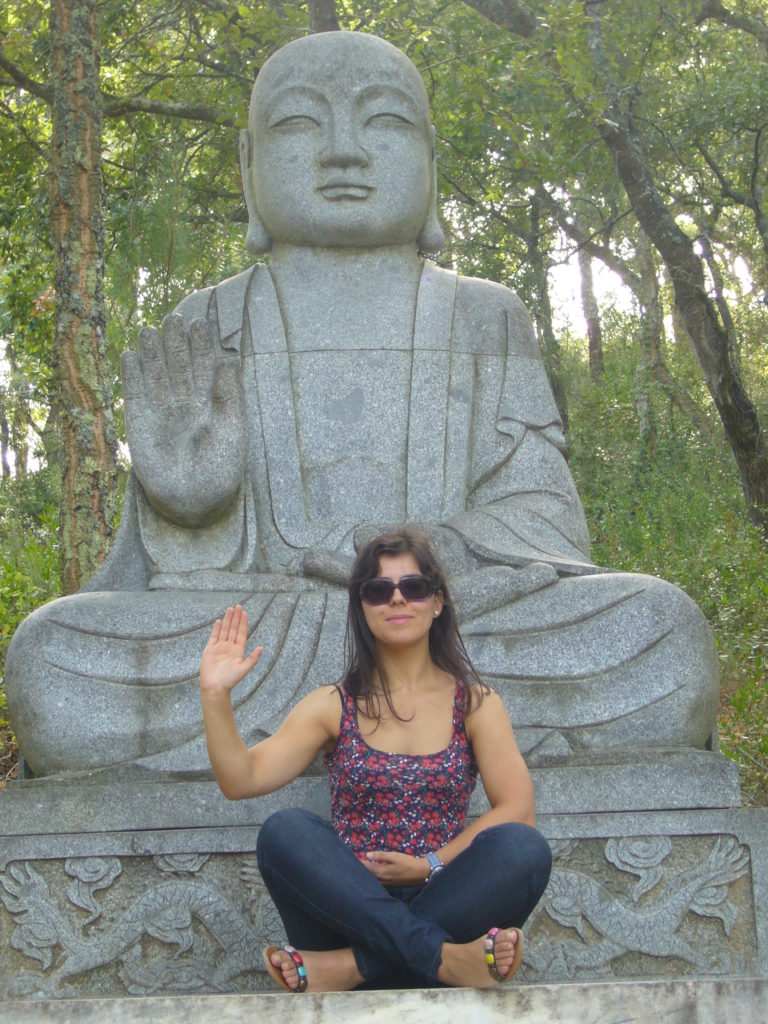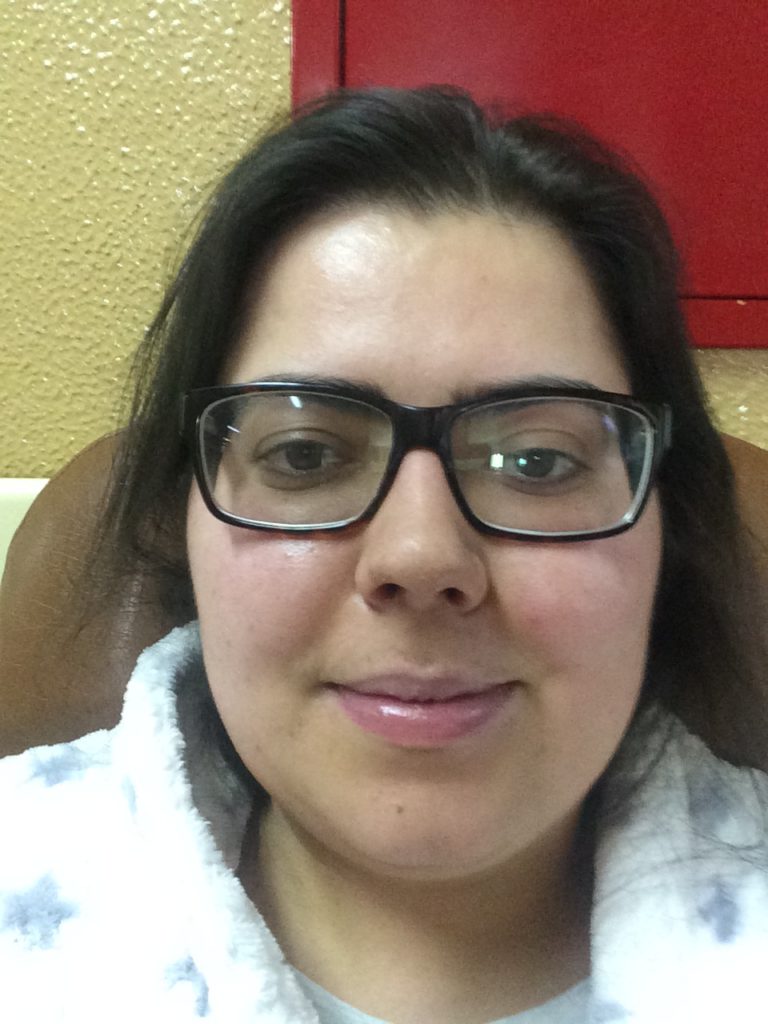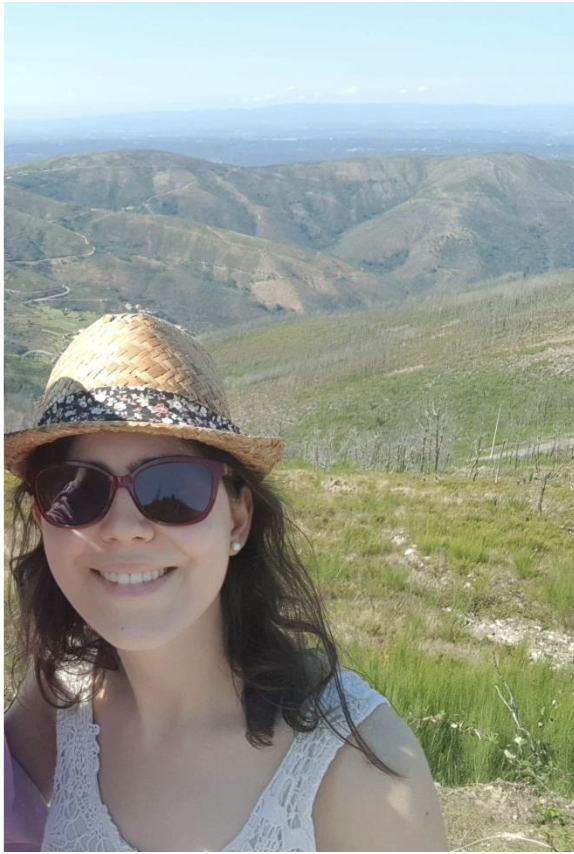Hi, my name is Sandra, I am 34 years old, I am from Portugal and I am a nurse.
What would I say to a person that just has been diagnosed with Cushings? “You are not alone” and “It will be a long journey but a very rewording one if you want”; Why? “I will tell you my story first, with all the details, just the way I wanted to read when I was first diagnosed”.
I was diagnosed with Cushing’s disease when I was 29 but my symptoms started when I was 24 with sleeping problems (waking up several times during the night). A few months after my hair started to fall out as well, which I related to the sleeping problems. I ended up having a sleeping test which didn´t show a major abnormality. I also started to take supplements for my hair. After that I realized that my sweat was very smelly compared to what it was before, so I went to an endocrinologist. I had some blood tests which were normal, and a 24 hour urine collection to test my cortisol, which turned out to be three times higher than the normal range. I took these results to my GP who said the elevated cortisol was related to daily stress, which made sense at that time as I was working a lot and having extra activities as well. Why didn´t I take the results back to the endocrinologist? I didn´t want to pay for another appointment, as I already spent a lot of money with private tests and appointments and also with the supplements, and I thought that the GP would interpret the results properly. Only one result was out of range and it had an explanation. I am quite sure that I googled it at the time, but didn´t find anything related to a disease.
When I was nearly 27 I realized that I was putting on weight (it was a small difference but it was in the abdominal area, which was not normal for me). After a few months I moved to London in the UK. I wanted a different experience as a nurse and I wanted to improve my English as well. During the first 18 months there, my symptoms got worse. I had insomnia very frequently, sleeping one or two hours per night a lot of times; I stopped having my period, which was explained by my gynecologist as a side effect of the pill that I was taking for a while; I was having hot flushes and sweating a lot, like I was in menopause; I was bruising very easily but all my blood results were normal; my libido was very low; my hair got a lot thinner even with supplements; I got a lot of thick hair on my back and neck; I got a hump on my back; I put on more weight (abdomen and face) and developed some purple stretch marks in my legs and abdomen, but not a lot; I was having problems with wound healing (I fell and got a wound on my leg that took 3-4 months to heal, when normally would take about a month); I was also having memory problems.
Only about a year later, in May 2016, I got really worried as I started having problems with walking up the stairs. I had to do it slowly and hold to the handrail to help me but had no problems when I was walking straight. I couldn´t find an explanation for that and didn´t even know to which specialist doctor to go. I also started to have constant hunger cravings and I would eat a lot each time. It was not every day but when it happened I would eat a lot until I was extremely full and I wouldn´t feel satisfied. It was so weird that I even considered I might have an eating disorder. By that time I remembered the high cortisol in the urine from a few years before. I went to the GP in London, explained this raised cortisol situation and ended up having a blood test for this. In July I received a letter to be referred to an endocrinologist in the hospital, so I googled it again, and maybe because it was in English, or maybe because I searched in a different way, I ended up finding that this high cortisol could be related with a tumour.
As I didn´t know when the appointment in the hospital was going to be, I booked a private endocrinologist in August, in Portugal, when I was on holidays. I told her all the symptoms and in the end she just said: “when you entered the room, your moon face was already very clear to me”. Having the confirmation from a doctor that I had a tumour somewhere in my body that was causing all of these symptoms made me the happiest person in the world. I had an answer for everything and I could finally focus on getting better. It was like I was “crazy” and suddenly I wasn´t, I was just very sick. I started to be followed up in the hospital where this doctor was working and in October I was admitted to have a lot of tests to confirm where the tumour was and to confirm the disease and I ended up finding that I also had osteoporosis, which was, to be honest, the most difficult thing to accept to learn how to live with, especially at work where I used to do a lot of manual handling. It took me several months and a lot of back pain to learn what I could do and what I couldn´t. I had my pituitary/transsphenoidal surgery on the 2nd January 2017. The last months before the surgery were very hard. I was eating a lot, put on a lot more weight, I was very tired, I had a lot of pain in my body, I was crying every day, not because all the changes in my body, but because I couldn´t recognize my face in the mirror and it was very painful. But at the same time I had a lot of hope in the future, and I never stopped believing, which gave me all the strength to keep fighting. I never stopped working even if it was very difficult. I would even make jokes to my friends with some of my changes. I even had two situations where people thought I was pregnant, which was actually funny.
The recovery from the surgery was ok, but my cortisol didn´t drop as expected, so they considered that probably it was not successful and I was discharged without taking any cortisol replacement (only “as needed” in extreme cases). I would be admitted again six weeks after the surgery to check all the levels again (it is the way it is done in Portugal). This period in between the two admissions was probably the worst I have experienced to this day. The day after I was discharged I started to develop tiny bumps that were itchy, like an allergy, which got worse through the days and made me go to a doctor and even with a biopsy and medication it didn´t get any better. I didn´t want to eat at all, I had a lot of pain in my body all the time. I couldn´t understand how could I feel so unwell, if the surgery was not successful, how was I feeling worse than before the surgery. I also ended up in the emergency department with a renal colic, but with no significant changes in my kidneys, which was weird. Thankfully one day after, I was again admitted to check my cortisol and it had dropped a lot, so all those symptoms were because I was not taking any replacement.
In the following months I had a slow but good recovery, I was seeing my body getting better and I started to work again. After three months of taking the cortisol replacement it was stopped by my doctor as the bloods were ok. Two months after that I went to the emergency department with sudden severe vomiting, diarrhea and dizziness (which I know now was an adrenal crisis; two hours after an IV of hydrocortisone and some fluids I was just fine), but at that time no one had told me that this can happen after you stop taking the cortisol replacement and that you should be aware of some signs and symptoms. The only information I had was if I felt very unwell, I should take a dose of the cortisol replacement. As I couldn´t take anything orally, I just said that in the emergency room and I had the IV dose.
I didn´t go back to normal, but everything got a lot better, even the osteoporosis. In May 2018 I felt the disease was back, even before I had bloodwork, and even before having any significant symptoms. I did labs in August and had the confirmation of recurrence in October 2018. Got admitted again for more tests and because the surgeries were very delayed and because I was working in London as a research nurse with a very good endocrinologist that told me I could have everything done in London, me and my Portuguese endocrinologist decided I was going to start the process in London. This time my symptoms were “on a small dose”, I was being more careful with food as well (I didn’t have regular cravings which helped), the worse was my sleep and my low libido and also a new symptom – palpitations – so I had to start a new medication. After a lot of exams in London (MRI, PET, IPSS) I finally had my second surgery on the 12th June 2019, which was not successful, so just six days after, on the 20th June I went for a third one which this time was successful. I had all of this with the support of some friends that were living in London as well, but away from my family, Portuguese friends and boyfriend, as I forbade everyone from travel to visit me, it was completely pointless, and a lot of them don´t even know how to speak in English.
The symptoms related to the disease have improved over time. As half of my pituitary gland was removed, some of my hormones weren´t in range, but nothing to be concerned about according to the doctors. I was followed by a specialist endocrinologist nurse who had explained everything I should know with all the details. Unfortunately, and in spite of the MRI not showing anything, my head was not ok. I was having a lot of headaches on the right side (the side where the tumour was removed), I couldn´t be in front of a screen (phone, TV, laptop) for more than 10 min, and the right side of my head felt very heavy, like something was pulling my head to the ground. The only way to feel better was lying in bed. Everyone seemed to think it was normal because I’d recently had two surgeries.
At the end of July, about a month after my last surgery, I started to feel slightly better. But by the end of August, while in Portugal on holidays, I felt a lot worse and ended up being admitted in hospital with suspected meningitis, which after a few exams, was not confirmed. When I went back to London in the beginning of September, my neurosurgeon said that probably it was the inflammation in the brain that was still present and it was normal. He wanted to wait another two months before becoming concerned. He couldn´t explain why I had been better for a short while but then got worse to the point of only being ok when lying down.
I spent the majority of the time until my next appointment in November lying in bed. I was also scared that I could do something that could make me go back to the hospital. I lost a lot of muscles in my body. I googled my symptoms and I couldn´t find anyone that had been through something similar. I didn´t know what to do. Even though he’d said differently earlier, the neurosurgeon didn´t give me any solution when I had not made progress by my appointment.
I decided I had waited long enough for things to improve, so I started with acupuncture and after a few weeks I started to feel some improvements. I stopped when COVID hit, but by that time I was a lot better. Don´t get me wrong, I was very far away from my baseline, but I was so much better than what I was before, that I was feeling great. I continued to improve slowly, and when I was feeling ok to go back to work part time almost a year after my surgeries, we were in the middle of the pandemic, so I decided instead to return to Portugal.
Currently I am still in remission and my Portuguese endocrinologist is trying to adjust the dose of my cortisol replacement, so some days are better than others but nothing that can´t be handled. My head is still not ok, but looking back, I can definitely live happy with these limitations. The worst is still the sleep, the low libido and the osteoporosis. My body and memory are not as they were when this all started but I love every piece of my imperfections in a ways that I couldn´t before. Just when I discovered that the tumour came back again I started a relationship (even after showing all my pictures and explaining everything that could happen, he wouldn´t let go) and now I am engaged, so, it is another bright side. I try to live a healthy life (more with food than with exercise to be honest, and sleeping as much as I can). I know that my body has been through a lot, so I treat IT the best way possible and I always try to improve.
Do I miss the old me? I miss some things, but all the knowledge that this disease brought me is way more than what I lost.
The worst things about my journey with this disease was the waiting time to have a date for my surgeries. After having a date, I was much more relaxed, but waiting for a date, knowing that day by day I was becoming worse and I was not seeing the light in the end of the tunnel was terrible. Telling people that I had a brain tumour the first time was rough. Even saying it was benign and hopefully it would be ok, people would be very scared. They wouldn´t tell me, but I could see it in their eyes; the silent suffering of my parents, I am 100% sure they suffered a lot more than me; To accept the regret of not going to the endocrinologist instead of the GP, it took me a very long time. But at the same time, how weird to remember I had a high cortisol a few years before and I wanted to check it again; Last but not least, feeling lonely a lot of times. I had a lot of support from everyone, but no one could really understand what I was going through, all my symptoms, how tired I was, how starved I was and so on. That was why I tried to read a lot of stories, mainly from CSRF, to help me.
I have learned to listen to my body, if something is not right it will give me small signs; to be very very very patient; to appreciate more of the “small things”, that in the end are the most important ones; to realize that what I used to consider problems, are not problems at all; to love my body more; to understand better the way my patients feel; to appreciate the “today”. We don´t know if there will be a tomorrow, so it is a shame to lose the today with concerns and anxieties that are pointless (meaning things that we cannot change); ask for help when you need it and let people help you. I was always very independent and never asked anyone for help and I realized that people like to help and it is ok to admit that we need that help; I also learned that is very important to have very good surgeons, that are specialized in pituitary surgeries (mine were great surgeons, but not that kind) and good endocrinologists that explain everything. Google information can be very bad if you don’t know which one you should believe.
I never asked “Why me?”, I always accepted. I know that there are a lot of people that are worse than me and that already have been through so much more. I have so much things and people to thank for, to be grateful for.







Sorry, comments are closed for this post.